 Remember Finding Nemo? If my website hadn’t died while I was getting ready to start this review a couple of hours ago[1], I might have more to say about whether I remember it, but apparently that will not happen anytime soon[6]. But here’s what I remember of relevance: when that one fish whose name I had forgotten lost his kid Nemo, he found another fish whose name I had forgotten to help him out. Later, a sequel!
Remember Finding Nemo? If my website hadn’t died while I was getting ready to start this review a couple of hours ago[1], I might have more to say about whether I remember it, but apparently that will not happen anytime soon[6]. But here’s what I remember of relevance: when that one fish whose name I had forgotten lost his kid Nemo, he found another fish whose name I had forgotten to help him out. Later, a sequel!
Thanks to the power of advertising, I now know that the second nameless fish is named Dory, and of course if there was going to be a sequel, they’d keep the name scheme intact, which also necessarily informs the plot. See, Dory, as you may or may not remember from the original[2], suffers from short term memory loss. Which means that once upon a time, she got lost, and she’s been lost ever since, even though she made new friends eventually like Nemo and what’s-his-name. I mean, it doesn’t mean that, but you can intuit it from her previous state of being completely alone in the ocean.
And then she figured out she got lost, and decided she wanted to get found, and there you have it: Finding Dory. That said, it’s a Pixar film, and therefore a kid movie[4]. That said, I actually felt like it was backward from the usual kid movie formula, in a way that maybe Pixar has always tried to achieve but with varying degrees of success. Because, this felt to me like a regular movie that has some jokes and gags thrown in to appease the kids in the audience, but mostly the eyerolling can be kept to a minimum.
I’m not sure this is even a justifiable take, but my reasoning is because of how delicately the concept of a mental disability was handled. On the one hand, yes, Dory causes a lot of her own problems, and it’s clear from both movies that when she’s on her own, she’s in a lot of trouble. She relies on the kindness of others to function in the world. But that doesn’t mean she doesn’t improve the lives of those others in countless ways, and the film is careful to stay aware of both sides of Dory’s coin. There’s nothing especially trite here, nor anything especially dismissive.
….okay, both parts of that last sentence are untrue, because it is, after all, a kid movie. But the things that were trite were the inevitable result of a necessary happy ending[5], and the things that were dismissive were in service of the theme. You have to hold up the ugly mirror to see past it, to coin an implausible metaphor.
Anyway, it was pretty dang good. Also, the 5 minute short film with the sandpipers (a type of ocean bird that lives in tidal regions) was freaking revelatory. Not worth the price of admission, probably, but maybe you can find it somewhere on the internets or in the future even if the main event is not your cup of tea.
[1] Not unlike my Pixel C died randomly yesterday; lesson: I should stop touching technology apparently.
[2] I did not[3]; I only remembered that her personality was quirky in some way.
[3] Perhaps ironically? Probably not though.
[4] If you don’t believe me, try sitting through the endless crap parade that informs the previews.
[5] If you think that’s a spoiler, you don’t understand much about Pixar.
[6] Outcome, now that the site is back up: I don’t have a review of Finding Nemo. So, uh, nevermind?
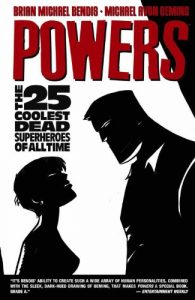 The last Powers book had a giant cliffhanger, right? Well, the 100% randomly named The 25 Coolest Dead Superheroes of All Time starts a year later. Some cliffhanger, guys! Aside from that letdown and the complete incongruity of the name compared to anything that happens[1], though, the plot was perfectly cromulent and pushed things a lot further forward than I would have guessed.
The last Powers book had a giant cliffhanger, right? Well, the 100% randomly named The 25 Coolest Dead Superheroes of All Time starts a year later. Some cliffhanger, guys! Aside from that letdown and the complete incongruity of the name compared to anything that happens[1], though, the plot was perfectly cromulent and pushed things a lot further forward than I would have guessed. At long last, I’ve played another Assassin’s Creed game. I must be at least four behind now? And at some point they get terrible, though I do not know what point that is. Anyway,
At long last, I’ve played another Assassin’s Creed game. I must be at least four behind now? And at some point they get terrible, though I do not know what point that is. Anyway, 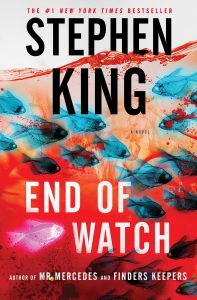 There was a time when I claimed that
There was a time when I claimed that 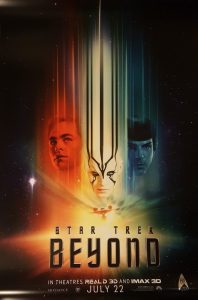 First of all, it’s weird that “Star Trek” has turned into an imperative verb in the new movie series. I mean, it is, right? Who is being commanded? I guess probably Kirk. (I reject the idea that the audience is the object.) And that established,
First of all, it’s weird that “Star Trek” has turned into an imperative verb in the new movie series. I mean, it is, right? Who is being commanded? I guess probably Kirk. (I reject the idea that the audience is the object.) And that established, 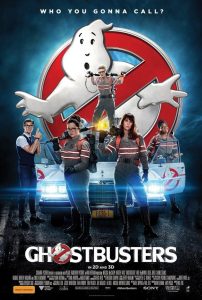 I actually saw two movies on Thursday prior to departing for a camping trip. As usual, I have squandered my chance at a timely review of a new release movie. This happens with such reliability that this can probably never be my actual job? No, I’m kidding, there are much better reasons for that outcome than lack of timeliness. Still, though, I’m here now, so let’s talk.
I actually saw two movies on Thursday prior to departing for a camping trip. As usual, I have squandered my chance at a timely review of a new release movie. This happens with such reliability that this can probably never be my actual job? No, I’m kidding, there are much better reasons for that outcome than lack of timeliness. Still, though, I’m here now, so let’s talk. Remember
Remember 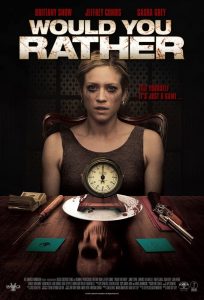 The difference between rich people and poor people, in a nutshell, is this: if you are rich, you can spend your money any way you want to. You can hire personal painters or musicians under the patronage system, or you can make bums fight on camera, or you can throw elaborate annual dinner parties for groups of strangers, where eventually they will play a high-stakes children’s game for your amusement. If you are poor, you can hope you find the rich person who wants to improve the atmosphere of the world to be your patron, but most likely you’ll only find the other rich people instead. Good luck!
The difference between rich people and poor people, in a nutshell, is this: if you are rich, you can spend your money any way you want to. You can hire personal painters or musicians under the patronage system, or you can make bums fight on camera, or you can throw elaborate annual dinner parties for groups of strangers, where eventually they will play a high-stakes children’s game for your amusement. If you are poor, you can hope you find the rich person who wants to improve the atmosphere of the world to be your patron, but most likely you’ll only find the other rich people instead. Good luck!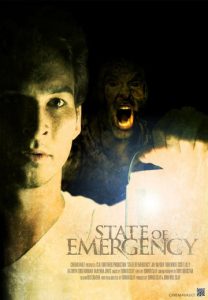 Last night was random Netflixing night. Well, semi-random; I was choosing from my pretty long queue list, but still. The result was the fairly disappointing
Last night was random Netflixing night. Well, semi-random; I was choosing from my pretty long queue list, but still. The result was the fairly disappointing 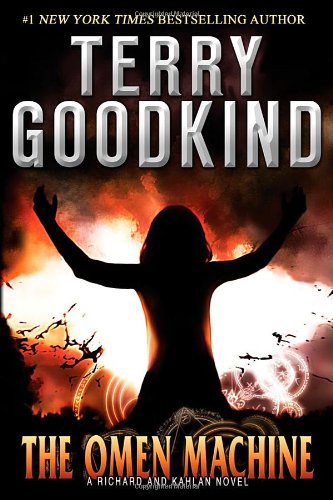 Eight years ago
Eight years ago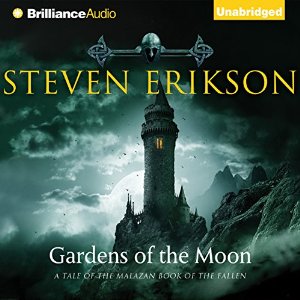 First thing: I’ve read
First thing: I’ve read